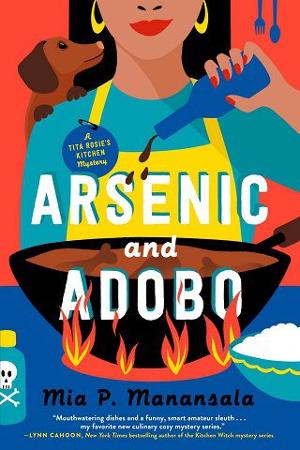Glossary and Pronunciation Guide
Glossary and Pronunciation Guide
HONORIFICS/FAMILY (THE “O” USUALLY HAS A SHORT, SOFT SOUND)
Anak (ah-nahk)—Offspring/son/daughter
Ate (ah-teh)—Older sister/female cousin/girl of the same generation as you
Bunso (boon-soh)—Youngest in the family
Kuya (koo-yah)—Older brother/male cousin/boy of the same generation as you
Lola (loh-lah)/Lolo (loh-loh)—Grandmother/Grandfather
Ninang (nee-nahng)/Ninong (nee-nohng)—Godmother/Godfather
Tita (tee-tah)/Tito (tee-toh)—Aunt/Uncle
FOOD
Adobo (uh-doh-boh)—Considered the Philippines’s national dish, it’s any food cooked with soy sauce, vinegar, garlic, and black peppercorns (though there are many regional and personal variations)
Almondigas (ahl-mohn-dee-gahs)—Filipino soup with meatballs and thin rice noodles
Baon (bah-ohn)—Food, snacks or other provisions brought on to work, school, or on a trip; food brought from home; money or allowance brought to school or work; lunch money (definition from Tagalog.com)
Embutido (ehm-puh-tee-doh)—Filipino meatloaf
Ginataang (gih-nih-tahng)—Any dish cooked with coconut milk, sweet or savory
Kakanin (kah-kah-nin)—Sweet sticky cakes made from glutinous rice or root crops like cassava (There’s a huge variety, many of them regional)
Kesong puti (keh-sohng poo-tih)—A kind of salty white cheese
Lengua de gato (lehng-gwah deh gah-toh)—Filipino butter cookies
Lumpia (loom-pyah)—Filipino spring rolls (many variations)
Lumpiang sariwa (loom-pyahng sah-ree-wah)—Fresh Filipino spring rolls (not fried)
Mamón (mah-MOHN)—Filipino sponge/chiffon cake
Matamis na bao (mah-tah-mees nah bah-oh)—Coconut jam
Meryenda (mehr-yehn-dah)—Snack/snack time
Pandesal (pahn deh sahl)—Lightly sweetened Filipino rolls topped with breadcrumbs (also written pan de sal)
Patis (pah-tees)—Fish sauce
Salabat (sah-lah-baht)—Filipino ginger tea
Suman (soo-mahn)—Glutinous rice cooked in coconut milk, wrapped in banana leaves, and steamed (though there are regional variations)
Ube (oo-beh)—Purple yam
OTHER
Diba (dih-bah)—Isn’t it?; Right?; short for “hindi ba” (also written as “di ba”)
Macapagal (Mah-cah-pah-gahl)—A Filipino surname
Mga ninang—In Tagalog, you don’t pluralize words by adding -s at the end. You add “mga” (mahng-ah) in front of the word
Oh my gulay—This is Taglish (Tagalog-English) slang, used when people don’t want to say the “God” part of OMG. “Gulay” (goo-lie) literally means vegetable, so this phrase shouldn’t be translated.
Tama na (tah-mah nah)—That’s enough; Stop; Right/Correct (depends on context)
Tsinelas (chi-neh-lahs)—Slippers/sandals
Utang na loob (oo-tahng nah loh-ohb)—Debt of gratitude (though it goes much deeper than that)
 Fullepub
Fullepub 



